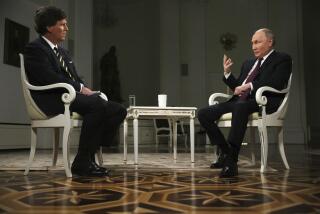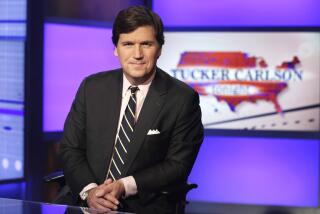TV AND THE GULF WAR : Hussein’s Calm Image Scores a Direct P.R. Hit
- Share via
If you’re CNN and have a chance to interview Iraq President Saddam Hussein, you do it, hoping that even while censored you’ll manage to impart something significant.
So late Tuesday there he was on CNN, sounding like his own good cop/bad cop, talking peace and body bags.
Yet what Hussein said to Peter Arnett in Baghdad is surely less important than the way he looked in his elegant civies: relaxed, confident, in control, even in good humor.
And above all, very presidential.
Even as bullets, bombs and missiles fly in the Persian Gulf War, one of the weapons most in use in the hostilities continues to be image. It’s the conflict’s common denominator, the one area of the war where the minds of President Bush and Hussein merge.
Certainly, oil slicks and Scud missile attacks on civilians are not effective ways to convert enemies to friends. Yet, just as Bush mightily tries to give the impression that he is no hostage to the Persian Gulf War--catch the latest business-as-usual photo opportunities on the nightly news--so too does Hussein apparently want to convey the same impression. What, him worry?
His propaganda is as much on the offensive as his military is on the defensive. While most of his military missiles continue to be blasted out of the sky, his P.R. warheads are reaching their target courtesy of TV.
Again, there was that lengthy CNN interview, which made for laborious listening because of the need to translate Hussein’s words into English. You started out watching and hearing, but soon found yourself only watching, as always the pictures eclipsing the sound.
Near the end of their time together, Arnett asked Hussein what he had hoped to achieve with the interview. Hussein: “I hope that you will tell the Americans that we wish them well, and we pray that none of their sons will die.” Yadda, yadda, yadda.
Didn’t matter.
What did matter were the impeccable grooming and tailoring, the body language, the self-confidence, the playfulness, the smiles, and yes, it has to be said, the likability.
What? The “Butcher of Baghdad” likable? Well, you could see for yourself.
You half expected a shrunken Hussein with dark circles under his eyes, nervous and edgy from lack of sleep while his nation and military reeled, perhaps even rambling, raging and twitching a la stories of Adolf Hitler in the dying days of the Third Reich.
Yet in this setting with Arnett, Hussein came across very, very well, ironically appearing at least as relaxed as Bush was in delivering his State of the Union address on TV that same evening.
Contrary to the cliche, the camera does lie.
“People don’t heed facts,” a veteran Hollywood press agent was saying recently. “They heed perceptions.”
Jimmy Carter understood that, even though his image control turned out to be far less proficient than pathetic. Ronald Reagan understood it too, a single TV picture of him making a speech in front of an oversized American flag overcoming even the most negative commentary about him. And surely Hussein, or at least some of those advising him, are just as perceptive about perceptions.
All right, you’re skeptical. If Hussein’s purpose is to weaken America’s resolve through TV, surely a single CNN interview won’t achieve that goal, especially weighed against the atrocities attributed to him.
Yet such things can work subtlely. P.R. campaigns consist of many elements designed to impact cumulatively, and with journalists from other countries now being allowed to join Arnett and his CNN colleagues in Baghdad, controlled glimpses of Iraq will further proliferate, perhaps chipping away at the demonization of Hussein.
Who’s to say that those images and memories of a benign-looking Hussein with Arnett won’t someday mingle in our minds to the advantage of the Iraqi leader?
“Thank you, President Saddam Hussein,” said Arnett, ending the interview. “Thank you,” Hussein said.
And you can bet he meant it.
More to Read
Sign up for Essential California
The most important California stories and recommendations in your inbox every morning.
You may occasionally receive promotional content from the Los Angeles Times.













